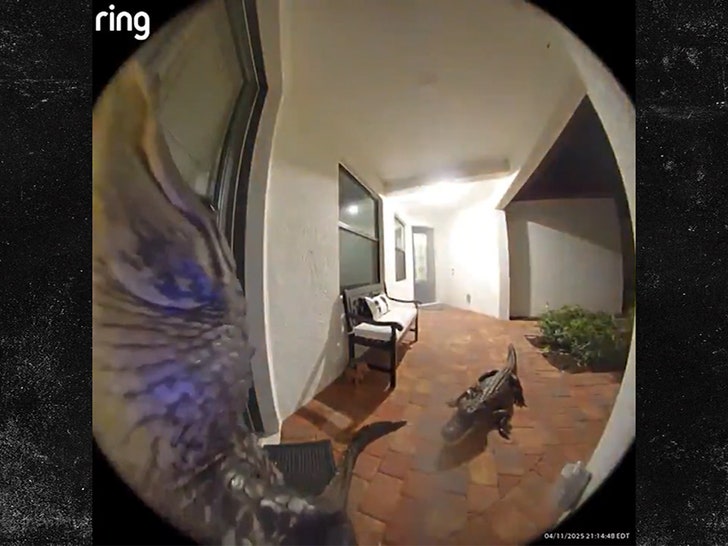In a rare and startling incident captured on home surveillance, a Florida family recently experienced an unexpected wildlife encounter—two large alligators approached their front door, and one even appeared to stand upright, prompting both concern and fascination across social media platforms.
The footage, recorded on a Ring doorbell camera in a suburban neighborhood in Florida, quickly circulated online, drawing attention from wildlife experts and curious viewers alike. This incident highlights a growing pattern of human-wildlife interactions in regions where residential development overlaps with native alligator habitats.
Captured on Camera: A Rare Close Encounter
The video shows two adult alligators slowly making their way across a family’s porch in the early morning hours. One of the reptiles approached the door directly, lifting its head and pressing its snout against the surface in a motion that appeared almost deliberate. Meanwhile, the second alligator lingered a few feet behind, seemingly watching the actions of its counterpart.
Although animals exhibiting curiosity near human dwellings is not uncommon in Florida, the apparent coordination and behavior of the reptiles in this instance caught viewers by surprise. The unusual moment was described by the homeowner as “intentional,” fueling speculation and commentary online.

Public Reaction and Safety Concerns
While some social media users responded with humor, calling it “Florida being Florida” or joking about a potential “gator uprising,” others voiced genuine concern. Many users shared their fears of what could have happened had a family member, particularly a child, answered the door without knowing who—or what—was on the other side.
“I thought it was funny until I imagined my toddler being the one to open the door,” one concerned parent wrote on Twitter. “Now I check our porch cameras every morning.”
These reactions underscore a growing public awareness of the risks associated with living near alligator habitats, especially as the creatures appear more frequently in residential areas.

Similar Incidents on the Rise
According to the Florida Fish and Wildlife Conservation Commission (FWC), interactions between humans and alligators have increased in recent years due to expanding development into previously uninhabited natural areas. The FWC reports that Florida is home to an estimated 1.3 million alligators, and as urban sprawl encroaches on wetlands, the likelihood of close encounters rises.
In one notable incident earlier this month, a resident in Venice, Florida discovered an alligator in her kitchen after the animal entered through a loosely latched screen door. The woman, startled by the intrusion, quickly contacted local authorities. Florida wildlife officers responded promptly and removed the eight-foot-long reptile safely. No injuries were reported.

Are Alligators Becoming More Comfortable Around Humans?
Alligators are known to be highly adaptive reptiles. While they typically avoid humans, some wildlife biologists have observed behavioral changes in urban and suburban environments. According to the University of Florida’s Institute of Food and Agricultural Sciences (UF/IFAS), these behaviors may be influenced by environmental factors such as food availability, habitat loss, and human activity.
Dr. Frank Mazzotti, a wildlife ecologist with UF/IFAS, explains that “alligators showing up in residential areas may reflect not only habitat overlap but also changes in behavior driven by access to food or lack of fear due to repeated exposure to human presence.”
However, it is important to note that experts do not currently have evidence suggesting alligators are becoming more intelligent or intentionally seeking out human contact. Rather, their behavior is more likely the result of environmental pressures and their natural instinct to explore.

What Should Residents Do if They Encounter an Alligator?
The FWC advises residents to never feed alligators, as it teaches them to associate people with food, increasing the risk of dangerous interactions. If an alligator is spotted in a residential area, residents should keep a safe distance, secure all outdoor doors and pet enclosures, and contact local wildlife authorities.
The FWC also operates the Statewide Nuisance Alligator Program (SNAP), which allows concerned residents to report potentially dangerous alligators. If deemed a public safety risk, licensed trappers are dispatched to remove the animals humanely.

Coexisting with Florida’s Native Wildlife
Florida’s natural environment includes a diverse range of wildlife, and alligators are an important part of the state’s ecosystem. They play a key role in wetland ecology by maintaining waterway balance and controlling populations of smaller species. As humans continue to expand into natural spaces, coexistence becomes both a necessity and a challenge.
To help reduce the chances of close encounters, experts recommend the following:
- Always supervise children and pets when outdoors near water bodies.
- Do not swim in lakes or ponds known to house alligators, particularly at dawn or dusk.
- Keep property clean and free of food waste that could attract wildlife.
- Install secure screen doors and close all access points at night.
Conclusion: Awareness and Respect Are Key
While the recent footage of two alligators approaching a Florida home may have seemed surreal or even humorous to some, it serves as a valuable reminder of the importance of respecting wildlife. With the population of both humans and alligators steadily growing, understanding how to coexist safely is essential.
As Florida residents and officials work to navigate this shared space, increased public education and proactive safety measures will be critical. Encounters like this underscore the need for awareness, caution, and responsible interaction with the state’s native species.
Sources:
- Florida Fish and Wildlife Conservation Commission – https://myfwc.com
- University of Florida IFAS Extension – https://ifas.ufl.edu
- National Geographic – Alligator behavior and habitat patterns
- Ring Home Security Blog – Wildlife captures on home surveillance systems
